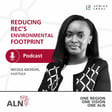Become a Creator today!Start creating today - Share your story with the world!
Start for free
00:00:00
00:00:01

Ubuntu Mental Health:Getting to grips with mental health literacy with Dr Mathero Michelle Nkhalamba
In this first episode of this Ubuntu Mental series with Dr Mathero Michelle Nkhalamba speaks with Thomas Pearson about the need for mental health literacy and understanding vicarious trauma.
Traditionally, the legal profession has normalised stress as part of its “tough it out” culture, because talking about mental health matters is considered a sign of weakness. However, overwhelming research has shown that there are higher levels of stress, anxiety and depression than before among lawyers, and there isn't a safe space to talk about it.
The first step is understanding the terminology and vocabulary used to describe how people are feeling, which is why mental health literacy is important, says Dr Mathero Michelle Nkhalamba, a renowned clinical psychologist from Malawi. “If you can't name what's happening inside you, you cannot focus on remedying the things that are causing you that distress.”
Nkhalamba says a good place to start talking about mental health literacy is at undergraduate law school level, as this will prepare young lawyers for the work and time-intensive environment that lies ahead of them.
She points out that the culture of always having to grind with no time for rest, to prove your mettle as a lawyer, needs to be replaced with one that includes self care practices and normalising being tired. She comments that racking up billable hours will count for little when productivity is eventually compromised.
Nkhalamba warns that stress has long term chronic effects such as hypertension, certain cancers, skin irritations and insomnia. She also explains in detail how the body reacts to stress and why it is deemed an occupational hazard.
Delving into another key topic, Nkhalamba unpacks what vicarious trauma is, the neurobiology of trauma and the signs and symptoms of the condition.
Interestingly, Thomas highlights a study that shows that playing Tetris can interrupt the response to trauma.
The episode wraps up with Nkhalamba offering advice on what can be done to address stress and trauma regardless of the lack of infrastructure around mental health well-being available.

















